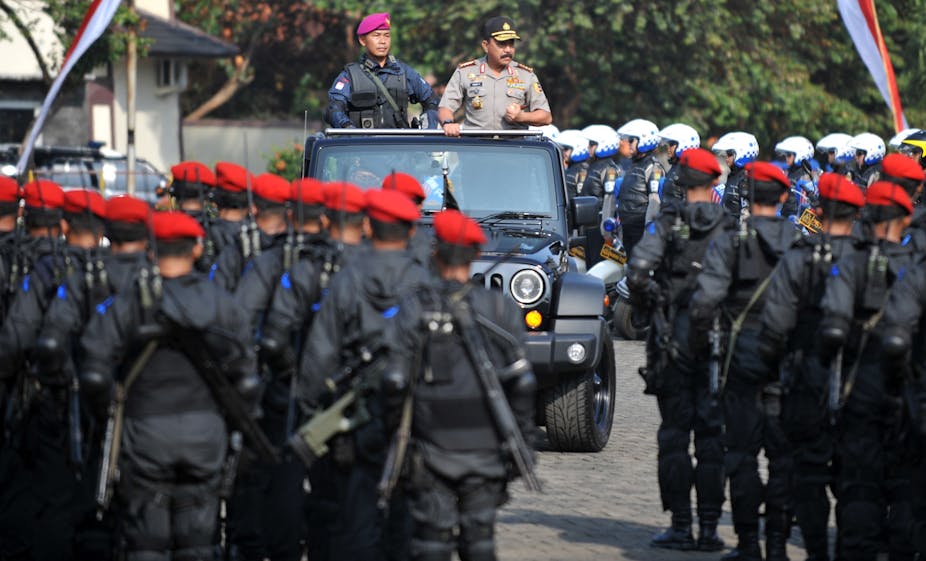President Barack Obama is being urged to raise human rights abuses with the Indonesian President during his visit to Bali. Indonesia is a key ally of the US, now America’s security focus has shifted to South-East Asia, yet violence is endemic in the Papua region, with police thought to be responsible for some of the worst abuses.
The Indonesian police force are often criticized for heavy handed tactics and endemic corruption. The underlying reasons for these problems are misunderstood leading to police reform efforts treating them as separate problems. In fact, violence and systematic corruption are deeply intertwined. This is evident from the ongoing industrial dispute at the world’s largest mine - Freeport McMoran’s Grasberg.
Last month, clashes between police and strikers saw the police fire shots at a recent protest, killing a striking employee and wounding dozens more. The dispute has escalated with the revelation that Freeport has been making undeclared multi-million dollar payments to the national Indonesian police and military.
‘Pocket money’
National Police Chief General Timur Pradopo has shrugged off the payments as mere “pocket money”. If that’s the case, the police must have some seriously deep pockets. Rights organisation, Imparsial, cites charges for “government provided security measures” from the company’s financial reports increasing from US$8 million in 2008, rising to US$10 million in 2009. Last year, the company paid out a colossal US$14 million to the police and the military.
“Why all the fuzz?” was the playful pun of one online commentator. “It’s a public secret that you can hire police services!!” While shocking, Freeport is not the exception. As matter of fact, off-budget payments are the norm within the murky world of police financing – a fact that has deep implications for the force’s human rights record.
Making up the shortfall
Indeed, the police are the first to argue that they are cash-strapped and thus open to fiscal opportunities. Despite a national budget that has skyrocketed by more than 600% percent in the past decade, police argue informally that they are forced to seek “off-budget” funds in order to make up the shortfall between their operating costs and their allocation of the state budget.
Police emphasise that to investigate cases or secure protests, they must levy unofficial “taxes” and take “donations” from the community. They want Indonesians to think about the off-budget economy as kind of shadow budget that makes up for the deficiencies of the state, rather than seeing it as all-out corruption.
But analyses of the police’s financial system reveal a much more complicated picture. The problem lies in poor budgetary prioritising, constipated financial transfers and chronic embezzlement.
Analysing the budget
Police HQ spends a quarter of the total annual budget just on itself. Most of the other 75% goes to salaries and infrastructure, not actual policing operations. In 2002, officers stationed in West Papua told researchers commissioned by Partnership for Governance that between 65-95% of their working budget came from undeclared, effectively criminal sources.
Financial officers couldn’t even say for sure what their total annual allocation was. They were frequently asked to sign for money that didn’t arrive. As a result, their annual financial reports were entirely fictionalised. The problem was not that there wasn’t any money in the institution, but transfers from HQ to stations across the country were deliberately, painfully slow and whittled down to nothing by the time they arrived.
The result was that up to 40% of the police’s annual budget was under-utilised and banked up at HQ in Jakarta. My field work shows fiscal reforms instituted in 2004 made little difference to the bottlenecking and pilferage.
A report funded by the US Department of Justice three years later in 2007 showed that police stations continued to operate without budgets or planning documents, falsifying their yearly audits.
As long as police-decision makers continue to create the circumstances of their own bankruptcy, they can justify taking undeclared donations to fund policing activities and levering a hefty personal cut in the meantime. Solvency is just not in their financial interest.
Security payments

In this budgetary climate, it’s not just Freeport McMoran that has had to cough contributions to keep up security. Across the Indonesian archipelago, traders and merchants of all varieties are paying for protection. This alliance between capital and coercion has a direct impact on the human rights of labour organisers and criminal suspects.
Every day labour organisers and criminal suspects accused of crimes in the country’s plantations, mines and gold shops are subjected to retributive shootings and police torture. In Lampung in June this year, journalists covering a labour dispute were shot at by a patrolling police officer. In January in Jambi, six alleged palm oil thieves were shot in the chest, back and face. Last year, in West Java, a student labour organiser was executed with a shot in the head after attending a protest.
As Indonesia debates how Freeport’s million dollar kickbacks to the police leads to poor human rights at the Grasberg mine, they would do well to remember that Freeport is operating within a wider structure where capital and coercion are dangerously aligned. This is more than a matter of raising salaries and the police budget. Until Polri’s financial system is subject to substantial reform and reorganisation, expect the shootings to continue.
An amended Bahasa Indonesia version of this article was published in Koran Tempo.

